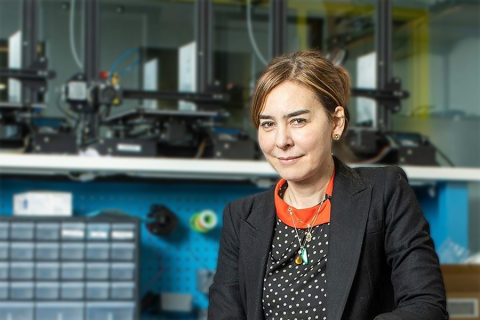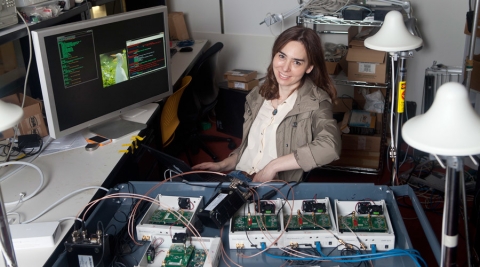Dina Katabi, MIT EECS Thuan and Nicole Pham Professor and CSAIL principal investigator, has been elected to the National Academy of Medicine (NAM) for “pioneering digital health technology that enables non-invasive, off-body remote health monitoring via AI and wireless signals, and for developing digital biomarkers for Parkinson’s progression and detection,” according to the organization’s press release.
As the director of the MIT Center for Wireless Networks and Mobile Computing, Katabi has helped advance the field of wireless data transmission by improving the data rate and reliability of WiFi and cellular systems. She has since applied this expertise toward building wireless devices that assist with digital health using AI and radio signals, detecting diseases like Parkinson’s from subtly informative actions, such as heart rate, sleep quality, and movements.
Back in 2023, for instance, Katabi developed an AI-powered device that can detect Parkinson’s based on how a patient breathes at night. Similar in appearance to a WiFi router, the system uses a neural network to evaluate whether a user has the disease and how severe it is. She helped create a similar device the year prior, which monitors the progression of Parkinson’s by using AI to analyze patients’ gait speed. That way, a doctor could track the severity of this condition between in-person visits.
Katabi is developing similar systems to better understand patients who may have diseases like Alzheimer’s, Rett syndrome, Crohn’s, and ALS (amyotrophic lateral sclerosis). Her work has helped establish objective, reliable indicators for diseases while helping track their trajectory and informing treatment responses in clinical trials. What’s more, she’s helped expose where AI models may make mistakes when making these diagnoses, finding that systems used to predict a patient’s race, gender, and age may use those traits as shortcuts.
Her other research interests include congestion control, scalability and robustness of communication systems, routing, content distribution, peer-to-peer systems, differentiated services, Internet pricing, and network measurement and security, particularly in adapting tools from applied mathematics such as control theory, coding theory, and AI to solve problems in computer networks. She is also a principal investigator at the Abdul Latif Jameel Clinic for Machine Learning in Health (Jameel Clinic) and a co-founder of Emerald Innovations.
Katabi’s latest honor will help her facilitate cross-disciplinary projects within the NAM, sparking novel approaches to “accelerate progress” towards global healthy equity. She is one of 100 new inductees to receive this yearly honor, with the academy having recently elected CSAIL colleagues like MIT professor Regina Barzilay and lab director Daniela Rus.
The MIT professor was previously elected to National Academy of Engineering and the National Academy of Sciences, making her a member of all three National Academies. Katabi is also a member of the American Academy of Arts and Sciences, and has received the MacArthur ‘genius grant’ and’ the Koji Kobayashi Computers and Communications Award. In 2023, Forbes named Katabi one of the world’s most influential women engineers, and the Association for Computing Machinery has called her “one of the most innovative researchers in the field of networking.”



